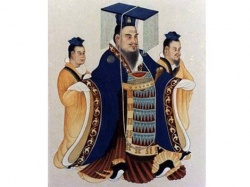Difference between revisions of "Emperor Wu of the Han Dynasty"
(Created page with "thumb|250px| Emperor Wu of the Han Dynasty, named Liu Che, who lived from 157BC to 87BC, was the fifth emperor in the Han Dynasty. He wa...") |
|||
| Line 1: | Line 1: | ||
[[File:Redtc40.jpg|thumb|250px|]] | [[File:Redtc40.jpg|thumb|250px|]] | ||
| − | [[Emperor Wu of the Han Dynasty]], named [[Liu Che]], who lived from 157BC to 87BC, was the fifth [[emperor]] in the [[Han Dynasty]]. He was enthroned at 16 years old and ruled 54 years. [[Emperor Wu]] was one of the talented and ambitious [[emperors]] in the {{Wiki|Chinese}} history, and [[Han Dynasty]] became the most powerful {{Wiki|nation}} at that | + | [[Emperor Wu of the Han Dynasty]], named [[Liu Che]], who lived from 157BC to 87BC, was the fifth [[emperor]] in the [[Han Dynasty]]. He was enthroned at 16 years old and ruled 54 years. [[Emperor Wu]] was one of the talented and ambitious [[emperors]] in the {{Wiki|Chinese}} history, and [[Han Dynasty]] became the most powerful {{Wiki|nation}} at that time in the [[world]] under his reign. |
| − | During the times of [[Emperor Wu]], in politics he adopted people-conciliation policy, perfect administration and supervision system to strengthen the centralization of authority; in economy he rectified finance, centralized the right of {{Wiki|iron}}, [[salt]] and coin under the central government, collected asset tax of businessmen; in {{Wiki|military}} affairs he defeated Huns' central plains [[aggression]] to establish basic domain of | + | During the times of [[Emperor Wu]], in politics he adopted people-conciliation policy, perfect administration and supervision system to strengthen the centralization of authority; in economy he rectified finance, centralized the right of {{Wiki|iron}}, [[salt]] and coin under the central government, collected asset tax of businessmen; in {{Wiki|military}} affairs he defeated Huns' central plains [[aggression]] to establish basic domain of {{Wiki|Chinese Empire}}; in {{Wiki|culture}} he put forward "Paying Supreme Tribute to [[Wikipedia:Confucianism|Confucianism]] while Banning All Other Schools of [[Thought]]" to consolidate the mainstream {{Wiki|status}} of [[Wikipedia:Confucianism|Confucianism]]; for the foreign relations, he sent {{Wiki|Zhang Qian}} to the {{Wiki|Western Regions}}, thereby developing the [[Silk Road]] and enhancing the communications with the [[west]] regions; in addition, he also [[attached]] great importance to talents development and established examine system which was the beginning of {{Wiki|Chinese}} systemic selecting talents system. |
| − | For [[Emperor Wu's]] great talent and bold [[vision]], The Strategies of Administration and {{Wiki|Military}} set a good example for the later hundreds of [[emperors]]; during [[Emperor Wu’s]] [[time]], "unification" not only initiated history [[river]] of | + | For [[Emperor Wu's]] great talent and bold [[vision]], The Strategies of Administration and {{Wiki|Military}} set a good example for the later hundreds of [[emperors]]; during [[Emperor Wu’s]] [[time]], "unification" not only initiated history [[river]] of {{Wiki|Han people}} forming and all nationalities unification, but also unfolded the [[prosperous]] chapter of {{Wiki|Chinese people}}. {{Wiki|Chinese}} famous historian {{Wiki|Jian Bozan}} once appraised appropriately, "His outstanding achievements and doings also penetrate deeply into our nation's history and [[tradition]]"[[Emperor Wu]] was buried at [[Wikipedia:Mausoleum of Mao Zedong|Mao Mausoleum]] which lies in the 40km [[northwest]] of {{Wiki|Xi'an}} and is the Key {{Wiki|Cultural}} [[Relic]] under the State-level Protection. [[Wikipedia:Mausoleum of Mao Zedong|Mao Mausoleum]] built grandly and filled with great and luxurious buried [[treasures]]. There are many tombs around [[Wikipedia:Mausoleum of Mao Zedong|Mao Mausoleum]], including Lady Li, {{Wiki|Wei Qing}}, {{Wiki|Huo Qubing}}, {{Wiki|Huo Guang}}, Jin Richan, etc. [[Wikipedia:Mausoleum of Mao Zedong|Mao Mausoleum]] ranks the top among Han Emperors’ {{Wiki|mausoleums}} in terms of scale, building [[time]] and the buried [[treasures]], so it is called "The [[Wikipedia:Chinese pyramids|Pyramid of China]]" |
{{R}} | {{R}} | ||
[http://www.cultural-china.com/chinaWH/html/en/33History151.html www.cultural-china.com] | [http://www.cultural-china.com/chinaWH/html/en/33History151.html www.cultural-china.com] | ||
[[Category:Chinese Buddhist History]] | [[Category:Chinese Buddhist History]] | ||
Latest revision as of 08:12, 7 February 2014
Emperor Wu of the Han Dynasty, named Liu Che, who lived from 157BC to 87BC, was the fifth emperor in the Han Dynasty. He was enthroned at 16 years old and ruled 54 years. Emperor Wu was one of the talented and ambitious emperors in the Chinese history, and Han Dynasty became the most powerful nation at that time in the world under his reign.
During the times of Emperor Wu, in politics he adopted people-conciliation policy, perfect administration and supervision system to strengthen the centralization of authority; in economy he rectified finance, centralized the right of iron, salt and coin under the central government, collected asset tax of businessmen; in military affairs he defeated Huns' central plains aggression to establish basic domain of Chinese Empire; in culture he put forward "Paying Supreme Tribute to Confucianism while Banning All Other Schools of Thought" to consolidate the mainstream status of Confucianism; for the foreign relations, he sent Zhang Qian to the Western Regions, thereby developing the Silk Road and enhancing the communications with the west regions; in addition, he also attached great importance to talents development and established examine system which was the beginning of Chinese systemic selecting talents system.
For Emperor Wu's great talent and bold vision, The Strategies of Administration and Military set a good example for the later hundreds of emperors; during Emperor Wu’s time, "unification" not only initiated history river of Han people forming and all nationalities unification, but also unfolded the prosperous chapter of Chinese people. Chinese famous historian Jian Bozan once appraised appropriately, "His outstanding achievements and doings also penetrate deeply into our nation's history and tradition"Emperor Wu was buried at Mao Mausoleum which lies in the 40km northwest of Xi'an and is the Key Cultural Relic under the State-level Protection. Mao Mausoleum built grandly and filled with great and luxurious buried treasures. There are many tombs around Mao Mausoleum, including Lady Li, Wei Qing, Huo Qubing, Huo Guang, Jin Richan, etc. Mao Mausoleum ranks the top among Han Emperors’ mausoleums in terms of scale, building time and the buried treasures, so it is called "The Pyramid of China"
